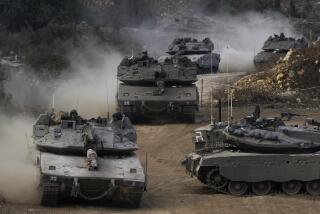Taliban Seizes Afghan Opposition Stronghold
- Share via
ISLAMABAD, Pakistan — Fears of a military clash between Iran and Afghanistan rose to new levels Sunday as the Afghan Taliban militia announced that it had taken control of an opposition stronghold with strong ties to Iran.
Mullah Wakil Ahmad, chief spokesman for the Taliban, said its forces had seized Bamian, a town in central Afghanistan that is the capital of the country’s Shiite Muslim minority. Afghanistan’s Shiite community, which numbers more than 600,000, maintains strong spiritual and political ties with Iran, whose population is predominantly Shiite.
The Taliban, the ultra-orthodox Islamic movement that controls about 90% of Afghanistan, adheres to the Sunni branch of Islam.
The Taliban announced its latest conquest as the first of 200,000 Iranian troops mobilized for military maneuvers along the Afghan frontier--the second such exercise in the past two weeks. Western diplomats said Sunday that the Iranians could launch a strike against the Taliban as early as Tuesday.
An armed clash between the two fundamentalist governments, each considered by Washington to be a major source of terrorism, has raised fears of a wider conflict in the historically unstable region. Afghanistan has been convulsed by civil war for more than two decades, and nearly all its neighbors--Pakistan, Iran and the former Soviet republics of Central Asia--have felt the effects.
Tensions between Iran and Afghanistan have risen sharply since last week’s admission by the Taliban that its soldiers had killed at least nine Iranian diplomats who disappeared in Afghanistan. The diplomats were killed last month when Taliban forces captured Mazar-i-Sharif, a city that had been held by forces opposed to the Taliban and supported by Iran. International human rights groups have charged that Taliban forces ruthlessly repressed the Shiite Muslims living in the city.
Iranian officials have warned in recent days that they would punish the Taliban for the deaths of the diplomats--and for the disappearance of more than 60 other Iranian nationals in Afghanistan. They have moved tanks and heavy artillery to Iran’s northeastern border, and earlier this month they staged a military exercise with 70,000 troops.
In what could be a prelude to a military strike, the Iranian government has asserted its right to use military force in self-defense under the United Nations Charter.
Taliban officials warned Sunday that any Iranian incursion would face a sharp riposte. They said they have strengthened their forces along the Iranian border and have armed Afghan civilians there.
“If Iran decides to invade Afghanistan, whether over land, through the air or by infiltrating anti-Taliban insurgents, let it be very clear: It will be committing a big mistake,” said Ahmad, the Taliban spokesman.
Western diplomats said that a direct military assault by Iranian forces appeared unlikely and that the most probable scenario would be an attack by about 8,000 anti-Taliban Afghans who have assembled along the border with Iran. Such a strike would probably require at least the indirect support of the Iranian military, the diplomats said.
About 1.4 million Afghan nationals reside in eastern Iran, most of them refugees from the war and most of them Shiite Muslims.
An airstrike by Iranian forces against the Taliban is also a possibility, the diplomats said.
Taliban spokesman Maluvi Abdullahi Mutmain said Sunday that Taliban troops faced only minor resistance before entering Bamian. He said Taliban forces had for the first time opened a road linking the Afghan capital, Kabul, with Mazar-i-Sharif in the north.
If that is true, it would represent a major victory by the Taliban. The doctrinaire religious movement emerged as the strongest of the many groups that set upon one another after the withdrawal of the Soviet Union in 1989.
The Taliban is made up of mostly ethnic Pushtuns who adhere to Sunni Islam. The civil war has pitted the Pushtuns against the country’s minority Uzbeks, Tajiks and Hazaras--the last of whom are predominantly Shiite.
Sunni and Shiite Muslims differ from each other in doctrine, ritual and religious organization. The principal difference is over the recognition of successors to the prophet Muhammad, who died in AD 632.
The capture of Bamian raised fears that Taliban forces might exact reprisals against the local Hazara population. There were widespread reports of atrocities committed against the Shiite Muslims by Taliban forces after they took Mazar-i-Sharif on Aug. 8. The reports remain largely unconfirmed because no independent observers have been allowed into the areas recently captured by the Taliban.
A war between Iran and Afghanistan would pose unique dilemmas for the U.S., which has strained relations with each nation.
In Afghanistan, the U.S. supported rebels during the 1980s as they resisted occupation by the Soviet Union. The U.S. backed away after the Soviets pulled out, and the rival groups began to fight among themselves.
In recent years, the U.S. and the Taliban have butted heads over the Taliban’s draconian interpretations of Islamic law, its maltreatment of women and its harboring of terrorists. Last month, the U.S. launched cruise missile strikes into Afghanistan aimed at crippling terrorist bases allegedly directed by Osama bin Laden, the Saudi-born renegade who has close relations with the Taliban. Bin Laden has been implicated in the Aug. 7 bombings of two U.S. embassies in East Africa.
U.S.-Iranian relations have been frozen since 1979, when Islamic revolutionaries took over the country and seized the U.S. Embassy and several dozen American hostages.
*
Times special correspondent Ismail Khan in Peshawar, Pakistan, contributed to this report.
More to Read
Sign up for Essential California
The most important California stories and recommendations in your inbox every morning.
You may occasionally receive promotional content from the Los Angeles Times.













